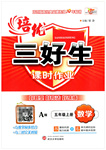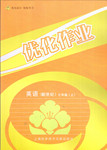题目内容
She forced herself not to give way ______ her emotion.[
A. to B. on C. at D. from
A

 培优三好生系列答案
培优三好生系列答案 优化作业上海科技文献出版社系列答案
优化作业上海科技文献出版社系列答案I began working in journalism(新闻工作) when I was eight.It was my mother’s idea.She wanted me to“make something”of myself,and decided I had better start young if I was to have any chance of keeping up with the competition.
With my load of magazines I headed toward Belleville Avenue.The crowds were there.There were two gas stations on the corner of Belleville and Union.For several hours I made myself highly visible,making sure everyone could see me and the heavy black letters on the bag that said THE SATURDAY EVENING POST.When it was suppertime,I walked back home.
“How many did you sell,my boy?”my mother asked.
“None.”
“Where did you go?”
“The corner of Belleville and Union Avenues.”
“What did you do?”
“Stood on the corner waiting for somebody to buy a Saturday Evening Post.”
“You just stood there?”
“Didn’t sell a single one.”
“My God,Russell!”
Uncle Allen put in,“Well,I’ve decided to take the Post.”I handed him a copy and he paid me a nickel(五分镍币).It was the first nickel I earned.
Afterwards my mother taught me how to be a salesman.I would have to ring doorbells,address adults with self-confidence(自信),and persuade them by saying that no one,no matter how poor,could afford to be without the Saturday Evening Post in the home.
One day,I told my mother I’d changed my mind.I didn’t want to make a success in the magazine business.
“If you think you can change your mind like this,”she replied,“you’ll become a good-for-nothing.”She insisted that,as soon as school was over,I should start ringing doorbells,selling magazines.Whenever I said no,she would scold me.
My mother and I had fought this battle almost as long as I could remember.My mother,dissatisfied with my father’s plain workman’s life,determined that I would not grow up like him and his people.But never did she expect that,forty years later,such a successful journalist as me would go back to her husband’s people for true life and love.
1.Why did the boy start his job young?
|
A.He wanted to be famous in the future. |
|
B.The job was quite easy for him. |
|
C.His mother had high hopes for him. |
|
D.The competition for the job was fierce. |
2.From the dialogue between the boy and his mother,we learn that the mother was _______.
|
A.excited |
B.interested |
|
C.ashamed |
D.disappointed |
3.What did the mother do when the boy wanted to give up?
|
A.She forced him to continue. |
|
B.She punished him. |
|
C.She gave him some money. |
|
D.She changed her plan. |
4.What does the underlined phrase “this battle”(last paragraph) refer to?
|
A.The war between the boy’s parents. |
|
B.The arguing between the boy and his mother. |
|
C.The quarrel between the boy and his customers. |
|
D.The fight between the boy and his father. |
5.What is the text mainly about?
|
A.The early life of a journalist. |
|
B.The early success of a journalist. |
|
C.The happy childhood of the writer. |
|
D.The important role of the writer in his family. |